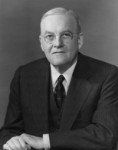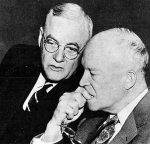 John Foster Dulles (1888-1959) was the United States Secretary of State between 1953 and 1959. He was an important if somewhat controversial figure who shaped American foreign policy in the first decade of the Cold War. Dulles was born in Washington DC to a notable political family: his uncle and grandfather were both Secretary of State before him, while younger brother Allen would become an early director of the Central Intelligence Agency (CIA). Dulles was educated at Princeton before completing a law degree at George Washington University. He served in the US Army during World War I and as a junior diplomat at the Paris peace conference in 1919. During the 1920s Dulles worked in a private law practice, however he specialised in international finance and played an important role in securing foreign loans for the struggling Weimar Republic.
John Foster Dulles (1888-1959) was the United States Secretary of State between 1953 and 1959. He was an important if somewhat controversial figure who shaped American foreign policy in the first decade of the Cold War. Dulles was born in Washington DC to a notable political family: his uncle and grandfather were both Secretary of State before him, while younger brother Allen would become an early director of the Central Intelligence Agency (CIA). Dulles was educated at Princeton before completing a law degree at George Washington University. He served in the US Army during World War I and as a junior diplomat at the Paris peace conference in 1919. During the 1920s Dulles worked in a private law practice, however he specialised in international finance and played an important role in securing foreign loans for the struggling Weimar Republic.
Dulles became more active in diplomacy and foreign policy during the 1940s. At the invitation of president Harry Truman he participated in the drafting of the United Nations Charter (this despite Dulles being a Republican and Truman a Democrat). He also served briefly as a US Senator in 1949. Dulles was vehemently opposed to communism, which he described as “godless terrorism”, and a firm advocate of the Domino Theory. In 1950 he authored War or Peace, a study of America’s Cold War foreign policy. In this book, Dulles recommended a more assertive and interventionist policy, both in Europe and Asia. He called on the White House to protect Taiwan, Korea and Vietnam from communist encroachment, using the force of arms if necessary. In January 1953 incoming president Dwight D. Eisenhower chose Dulles as his Secretary of State. His leadership of the State Department was controversial but undoubtedly influential.

Unlike other diplomats, Dulles was not always cautious with his public statements. In stark contrast to the reserved Eisenhower, Dulles was fond of belligerent rhetoric, accusations of deceit and threats of military retaliation. When it came to actual policy, however, Dulles was less aggressive and more pragmatic. Evidence of this can be found in his handling of the Cold War in Asia. Having urged the deployment of US troops in Korea in 1950, by 1953 Dulles was pressuring all sides to sign an armistice. Dulles was instrumental in forming SEATO, an Asia-Pacific alliance designed to contain communism, not to roll it back. In 1954 Dulles and Eisenhower refused to commit US air support to support French troops in Dien Bien Phu, northern Vietnam. Later that year Dulles attended the Geneva conference that considered the future of Vietnam. He refused to recognise or negotiate with Vietnamese communists, and later refused to sign the Geneva Accords.
Dulles suffered from bowel cancer during his last three years in office. Terminally ill, he resigned in April 1959 and died five weeks later. Dulles’ use of belligerent rhetoric and brinkmanship, while seeking practical solutions to avoid war or foreign entanglements, defined America’s approach to the Cold War in the 1950s.

John Foster Dulles on the need for “massive retaliatory power” (January 1954)
John Foster Dulles on Cold War issues and policies (April 1957)
John Foster Dulles on the launching of Sputnik I (May 1957)
Content on this page is © Alpha History 2018-23. This content may not be republished or distributed without permission. For more information please refer to our Terms of Use.
This page was written by Jennifer Llewellyn and Steve Thompson. To reference this page, use the following citation:
J. Llewellyn & S. Thompson, “John Foster Dulles”, Alpha History, accessed [today’s date], https://alphahistory.com/coldwar/john-foster-dulles/.
